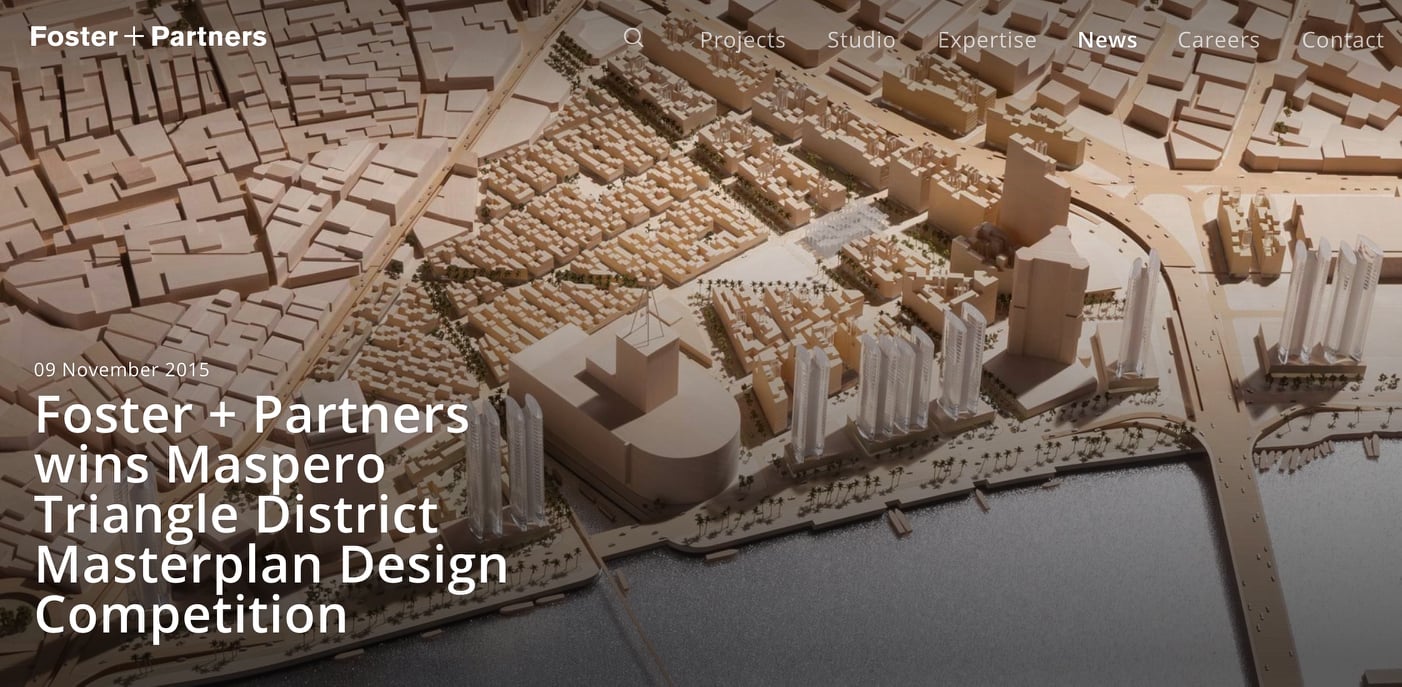
Pedro B. Ortiz
The urban fabric before demolition.
Quite an Arab/Egyptian tight urban structure out of cultural and climatic character.
I did walk around. Derelict but fascinating.
The Foster project understood and preserved that in the proposed new rational fabric. What a pity the actual official project.
I cry for you Cairo
Pedro B. Ortiz
location in central Cairo.
I was the President of the Jury 4 years ago. I was proud of the Jury decision.
The Foster and Partners project was quite good. (above photo).
It blended all types of housing typologies to allow actual slum settlers to stay in the area. But that is not what they are doing.
The actual project is a series of international corporate architecture blocks (below photo). A project eager to give an image of ‘modern international’ Egypt.
Egypt is not London.
Egypt is more than that.
Do the Egyptians understand that or it is an inferiority complex what makes them try to like like the ones they wrongly admire?
I am very sorry for Cairo…
Adil Abdalla:
I had addressed their issue several times while it was progressing..
Unfortunately, urban preference is not usually an economic or political one.. I understand that there were 3 parameters that were not shared with the competitors or the jury:
1. Cairo CBD should be cleared from low-income residential to allow for comprehensive face-lift, considering land value and tourist use
2. Development conglomerates offered high bids for regeneration and developing the ancient planned parts (Not slums but deteriorated townships). Then legal and administrative mechanism works hard.
3. Influential Egyptian architects and urbanists were unable to educate the government for adequate and practical solutions.
Like any other 3rd world government, welfare is not preserving old urban patterns, but to feed bellies and shelter increased populations
It is a true dilemma, and a daily de-facto situation
Then legal and administrative mechanism had delivered the necessary land-pooling.
In Egypt, since Ottoman era, all land are owned by military, unless set within recognized urban borders. This had enabled the Land Managers to be skillful, while ruled all new developments since 1970. During the eviction process, many abuse and frauds had been recorded; while both government and NGOs had stretched their muscles.. Of course, government wins.
Dubai Syndrome had mutated the inexperienced urban managers across the 3rd world; provide any easy formula of Political, PR and Business WOW factors.. Egyptian managers are no exception due to many historical, bureaucratic and system glitches.
However, the syndrome had been hardly criticized among the efficient Asian managers; who were pioneers in rapid urban developments, based on technical skills, economic resources and mature real estate mechanism..!
Maspero Triangle was not the First, nor the Last..!

Your article gave me a lot of inspiration, I hope you can explain your point of view in more detail, because I have some doubts, thank you.
Not only Hassa Fathi, but many architects had visions about how architecture would serve the people.. Not necessarily that all nice concepts are practically successful.. Yes, architecture by definition is a wealthy-application of living; yet, the undeniable need for shelter has its own parameters, which H.Fathi and others could not meet.. Therefore, their inspirational concepts are good for textbooks, for the wealthy to procure, but not for the ordinary to afford..
On parallel, H. Fathi was not an urban planner, but a decorated architect; who had inspired my researches and trails.. Urbanists are who create happy settlement which are sustainable and livable, with margins for the occupiers to innovate and adapt..
The core constraints within the 3rd world, is the (Culture of Governance).. There are many nice abstracts and articles, yet ineffective with structural faults.. Linguistic Gaps drive both Managers and Professionals to pretend comprehensive understanding, while they are not. Most of the debates miss fundamental terminologies and epistemic structures.. Yes, mostly fit for academic papers and researches, but not for reality checks and implementations.. During my career with various governments, I understand that minutes of meetings doesn’t reflect the discussions.. as said, the Devil within the unwritten details and documentations.. This is our urban grassroots
Angela Conte: With our universal access to information there is less excuse for a lack of government controls due to “immature policies” and we are then left with only human nature to blame. As we wait for the 3rd world to catch up we watch the 1st world fall behind.
I believe Hassan Fathi has been overvalued for affordability, yet he had successfully established a theme for the wealthy.. There are serious critics on his famous trials and abstracts compared to unknown others..
Agreed Angela, yet the 3rd world has immature policies, systems and managers; which enable violation of textbooks; with little opportunities for civic society to intervene.. Adding, the long stand problem of capacity building among civic servants and professionals, to effectively and rationally contribute to urbanity.
Angela Conte: Not just 3rd world governments. It is a problem even in the United States and anywhere where value is put on hoarding resources rather than equitable distribution.
Angela Conte: So they can say how they took the time to listen to the people/professionals before making their decisions and then do as the wealthy power elites dictate. And also, so much better for one’s conscience to have someone else to blame if people dislike the decision. Politicians are much better at bargaining than making thoughtful decisions.